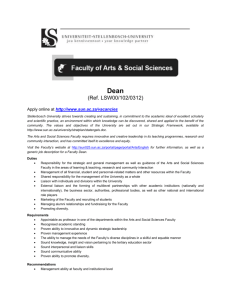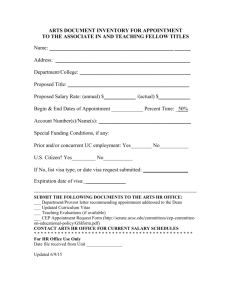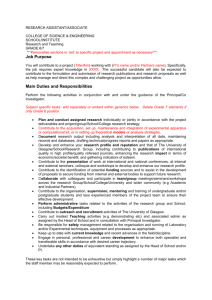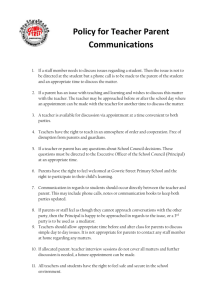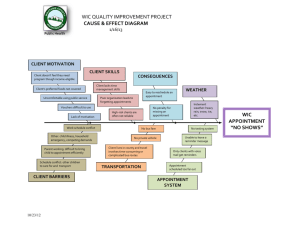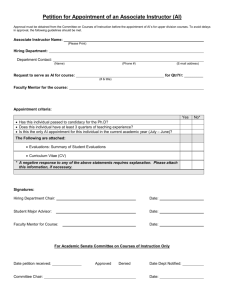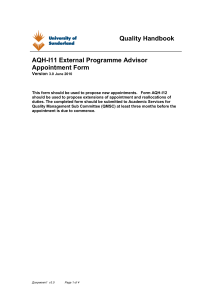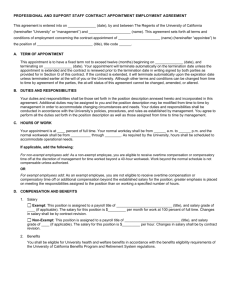Terms and conditions - Academic related staff HRP036
advertisement
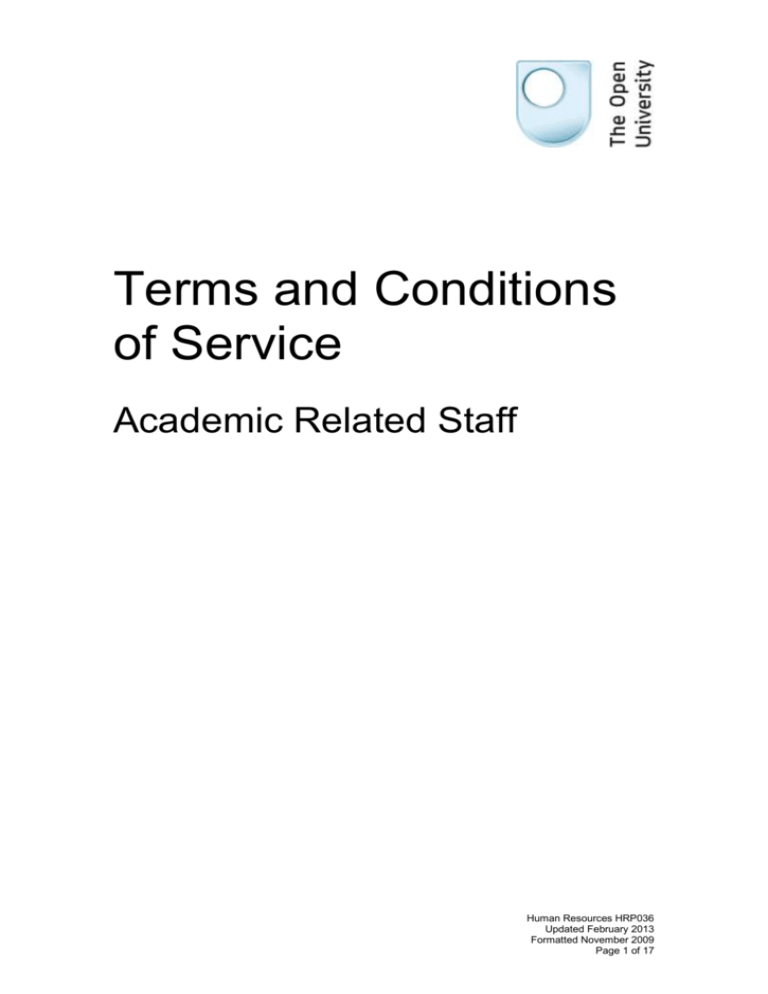
Terms and Conditions of Service Academic Related Staff Human Resources HRP036 Updated February 2013 Formatted November 2009 Page 1 of 17 Contents 1. 2. 3. 4. 5. 6. 7. 8. 9. 10. 11. 12. 13. 14. 15. 16. 17. 18. 19. 20. 21. 22. 23. 24. 25. 26. 27. 28. 29. 30. 31. 32. 33. 34. 35. 36. 37. 38. 39. 40. 41. 42. 43. 44. Application of these Terms and Conditions ......................................................... 3 General Conditions ................................................................................................. 3 Equal Opportunities ................................................................................................ 3 Trade Union Rights ................................................................................................. 3 Review of Conditions of Service............................................................................ 3 Appeals ..................................................................................................................... 4 Remuneration........................................................................................................... 4 Career Development And Staff Appraisal (CDSA) ............................................... 4 Promotion and Additional Salary Incrementation and Special Awards ............ 4 Discretionary Awards.............................................................................................. 4 Superannuation ....................................................................................................... 5 Travel and Subsistence .......................................................................................... 5 Residence ................................................................................................................. 5 Removal Expenses and Disturbance Allowance ................................................. 5 Movement of Staff ................................................................................................... 5 Office Moves ............................................................................................................ 6 Copyright in Course Materials ............................................................................... 6 Copyright in Books ................................................................................................. 7 Copyright in Other Works Produced by Members of Staff ................................. 7 Legal Action Arising From Works Produced for The University ....................... 7 Dispute over Copyright ........................................................................................... 8 Inventions ................................................................................................................. 8 Medical Examinations At Appointment................................................................. 9 Medical Examinations during Employment .......................................................... 9 Sickness and Sick Pay ............................................................................................ 9 Maternity and Child Care Provisions .................................................................. 11 Holidays .................................................................................................................. 11 Confidential Information ....................................................................................... 11 Tuition Fees - Open University Courses ............................................................. 12 Property .................................................................................................................. 12 Accidents................................................................................................................ 12 Health and Safety .................................................................................................. 12 Protection of Rights .............................................................................................. 12 Personal Files ........................................................................................................ 13 Grievance and Disciplinary Procedures ............................................................. 13 Leave Of Absence ................................................................................................. 13 Recruitment Policy ................................................................................................ 15 Duration and Termination of Appointment ......................................................... 15 Probation ................................................................................................................ 15 Duties ...................................................................................................................... 16 Hours of Work ........................................................................................................ 16 Extra-Curricular Work ........................................................................................... 16 Efficiency Bar ......................................................................................................... 17 Updates/Changes to the Terms and Conditions of Service ............................. 17 Human Resources HRP036 Updated February 2013 Formatted November 2009 Page 2 of 17 1. Application of these Terms and Conditions These terms and conditions of service apply to all UAP Academic Related members of staff including Administrative, Senior Library, Computer, Editor, Designer, Specialist groups; Course Coordinators and Course Managers; Assistant Project Officers, Project Officers and Senior Project Officers. Any variations applicable to a member of staff appointed to these posts part-time will be on a pro-rata basis in relation to the terms and conditions applicable to full-time staff, and will be stated in the letter of appointment. (The Council of the University may from time to time extend these terms and conditions to other members of staff with such variations as may be appropriate.) Any significant variations will be reported to the OU/OUAUT Negotiating Committee. 2. General Conditions All appointments are made subject to the Charter, Statutes, Ordinances and Regulations of the Open University (hereinafter called the University) for the time being in force. The University Council may add to or amend these conditions of service from time to time after negotiation with the OUAUT in accordance with the agreed procedural arrangements. Whenever these conditions of service are altered in any significant respect, any staff member may opt to continue under such previous conditions as have been applicable to him/her. The University will give six months' notice of the formal adoption date of material new conditions of service, and shall simultaneously provide copies of these terms and conditions to all members of staff affected. A member of staff must notify the Secretary by this date if he/she wishes to continue under his/her previous conditions. 3. Equal Opportunities The Open University aims to create the conditions whereby students and staff are treated solely on the basis of their merits, abilities and potential, regardless of gender, colour, ethnic or national origin, age, socio-economic background, disability, religious or political beliefs, family circumstance, sexual orientation or other irrelevant distinction. The University has an action plan to implement this policy. The effectiveness of this policy shall be reviewed regularly with the OUAUT by such means as shall be agreed. 4. Trade Union Rights A member of staff has the right to be a member of such registered Trade Union as he or she may choose, and to take part in its activities at the appropriate time. The University has recognised the Association of University Teachers as the appropriate negotiating body for staff in the categories designated in clause 1 of these Terms and Conditions of Service. 5. Review of Conditions of Service Conditions of Service will come up for review from time to time, or on particular occasions where the University or the OUAUT representing the staff considers a matter to be one of sufficient urgency. Before adoption, any suggested alterations, additions or deletions Human Resources HRP036 Updated February 2013 Formatted November 2009 Page 3 of 17 shall be the subject of negotiation with the OUAUT, in accordance with the agreed procedures. 6. Appeals Appeals against the mode of implementation of any of these conditions of service shall be made in accordance with the 'Procedures for dealing with work problems and issues raised by members of UAP Staff' (see Clause 35). 7. Remuneration Remuneration will be in accordance with that approved from time to time by the appropriate national authority. The current salary scales are shown in Appendix I(a) and (b). These scales are subject to national negotiations and are normally increased as a result of any agreed cost of living award on the 1st April annually. Salaries are paid monthly in arrears in equal monthly instalments by Bank Credit on or before the last day of each calendar month, and the individual salary of a member of staff and the amount credited each calendar month will be notified to him/her in writing. The annual incremental date for all staff members will be 1st October except that persons appointed or promoted after 1st April in any one year will receive their first subsequent increment on 1st October of the following year. The Council may, however, waive this exception where special circumstances are deemed to exist. The next incremental date will be borne in mind when the starting salary is set for staff members appointed or promoted between 1st April and 30th September. Where a general or national salary award takes effect on or between 1st April and 30th September, this will not affect the normal payment of the next increment on 1st October of the same year unless the terms of the award specifically preclude it. Whenever under any scheme approved for the Universities of Great Britain a London Allowance is payable, members of staff who are appointed to, or whose place of work is the London Regional Office, will be eligible for such an Allowance. 8. Career Development and Staff Appraisal (CDSA) CDSA of staff is undertaken within the principles of the national agreement of the UAP and the AUT arising from the 23rd report of Committee A. The University's scheme of CDSA is as agreed from time to time with the OUAUT (copies are available from Human Resources). 9. Promotion and Additional Salary Incrementation and Special Awards A review of all staff covered by these conditions will take place annually in accordance with the procedures laid down by the Council, and extra increments (over and above the normal annual increment), and promotions may be approved which shall normally take effect on 1st October in the calendar year in which such approval is given. Special Award payments may also be made periodically. 10. Discretionary Awards If a national salary award contains an element of "discretionary payments", the Council will first ascertain the views of the OUAUT as to whether that element should be accepted or rejected, and in the event of acceptance, as to the manner of application. If it is accepted, the University will administer the discretionary element, so far as the terms of the award permit, in a manner agreed with the OUAUT. Human Resources HRP036 Updated February 2013 Formatted November 2009 Page 4 of 17 11. Superannuation Each member of staff has the option of joining the Universities' Superannuation Scheme. The appropriate employee's contribution is paid by monthly deductions from salary. The Universities' Superannuation Scheme is contracted out of the State Earnings Related Pension Scheme. 12. Travel and Subsistence Members of staff travelling on official University business will be reimbursed necessary expenses in accordance with the approved scheme for travel and subsistence allowances (Appendix II). 13. Residence Staff members are normally expected to live within reasonable travelling distance of Walton Hall, or other permanent place of University employment. Reasonable in the sense of this clause means a distance that in travel to and from work does not significantly impair the member's ability to perform his/her duties. 14. Removal Expenses and Disturbance Allowance Persons taking up a first appointment under these conditions are entitled to a grant towards meeting the ranking expenses of removal necessarily incurred as a result of accepting an appointment with the Open University, provided that in all cases the appointment is for a period of not less than two years. Staff on short-term contracts of less than two years will be eligible for such a grant if their appointment is extended to two continuous years or more. The amount of grant shall be in accordance with the agreed scheme for removal expenses (available from Human Resources). A staff member who resigns from the University within one year of appointment shall be liable to repay the whole of such grant. A staff member who resigns from the University after completing one year of service but within two years of appointment shall be liable to repay half of such grant, (except that where a member of staff resigns as a result of non-confirmation of probation, he/she will not be required to repay the grant). Staff members recruited from overseas will receive grants as determined in each individual case by the Council or by such body as has been authorised by the Council to determine such grants. Normally grants will only be payable when the previous residence was in excess of 25 miles of Walton Hall, or the place of employment with the University. The new residence must be nearer Walton Hall or the place of employment with the University than the previous residence was, and it must also be within a 25 mile radius of Walton Hall or other place of University employment. Staff members who are still maintaining through circumstances beyond their own control, a family home at the place from which they were appointed and paying for lodgings in the area of their employment may be eligible for a disturbance allowance. Details are available from Human Resources. 15. Movement of Staff Conditions relating to compensation where an existing member of staff undertakes a period of service or a new appointment with the University in a location other than that for which they were originally recruited, are set out in the policy on Movement of Staff within the United Kingdom, available from Human Resources. Human Resources HRP036 Updated February 2013 Formatted November 2009 Page 5 of 17 16. Office Moves Conditions relating to compensation where an office is moved from one geographical location to another are set out in the Office Moves Scheme which is available from Human Resources. 17. Copyright in Course Materials Where a staff member has taken part in the preparation of course materials and subject to any existing copyright in material incorporated into course material, the copyright and any design rights in all course materials belongs to the University. For this purpose course materials are defined as any work, whether in written, broadcast or recorded form including computer programs produced by one or more members of staff in the normal course of their duties for use in or in connection with a course offered by the University, except that books are included in this definition only where they are written specifically as part of a course and as a part of normal teaching or course production duties. (a) The sale and distribution of these course materials to people other than students registered on OU courses, or their presentation by the University, in a form different from that originally produced and approved may only take place after reasonable consultation with and with the consent of the originating author responsible where he/she can be identified, such consent not to be unreasonably withheld. If the originating author responsible cannot be identified, with the consent of the course team (through the Course Team Chair), and if this is not possible then with the consent of the Dean of the relevant Faculty, such consent not to be unreasonably withheld. (b) Members of staff will, when requested by the University, do whatever may become necessary from time to time, including the execution of documents, to enable the University to exercise its rights over such course materials. (c) The University shall pay into a General Purposes Fund a percentage (to be determined by the Council from year to year upon the recommendation of the Finance Committee) of the net profits (as determined by the University) derived by the University from the exploitation of such course materials otherwise than through the distribution of such work to registered students of the University. The objectives and operation of the General Purposes Fund will be reviewed regularly by the Senate and the Council. The General Purposes Fund shall not be used for any purpose which is a proper charge upon public funds, but shall be used with particular regard to the welfare, conditions of work, personal, educational and career development of staff. (d) Where a member of staff is identifiable as the author of any course material forming part of an Open University course, the University will not, without prior consent of such member, circulate such material to its students, broadcast it, or sell or assign it to any third party after the expiration of the academic life of the course or any extension as approved by the Senate or its nominee (which starts from the date when the material is first broadcast as part of an Open University course or first distributed to students of the University in printed or recorded form, whichever shall be the earlier) except in circumstances approved by the member, such approval not to be unreasonably withheld. Approval shall be deemed to have been given if the University shall have taken all reasonable steps to secure such approval, but the member cannot be located or approached. (e) Any member, or former member of staff will, subject to the prior consent in writing of the University (which shall not be unreasonably withheld) and to any copyright held by a third party, be entitled to use without charge, agreed Human Resources HRP036 Updated February 2013 Formatted November 2009 Page 6 of 17 extracts from course materials of which he/she is the identifiable author or part author. (f) Copyright in course materials produced by identifiable members of staff offered to but which are not accepted by the University for inclusion as course materials belongs to the appropriate member or members of staff except in respect of materials produced by the BBC. (g) A member of staff where he/she is identifiable as the author of course material shall have the right to seek permission to acquire copyright in his/her course material after the life of the course or any extension as approved by the Senate or its nominee. Such permission shall not be unreasonably withheld. 18. Copyright in Books (a) The copyright in books (other than books covered by the definition of course materials in clause 17 above) written or edited (including as a general or advisory editor to a series) by a member of staff during his/her appointment with the University in his/her own time and other than in the normal course of his/her duties, will not vest in the University but in the member of staff. (b) Notwithstanding the provisions of 18(a) above, where a member of staff writes a book at the suggestion of, or in anticipation of a need by a course team then, if that book is subsequently designated as a 'set book' (as distinct from 'recommended reading' book), such member will, in consultation with the University, publish it or arrange for its publication so far as is practicable in such manner as will meet the needs of the students of the University and such University regulations as are then in force. Where a course team wishes to prescribe as set reading a book written solely (or partly) by a member of staff, this shall only be done with the approval of the specified Pro Vice-Chancellor or the Vice-Chancellor in accordance with the procedures approved by the Council in September 1983 (C/C XX I/7 Appendix IV). In any arrangements made for the production of such 'set books' the aim will be to secure the legitimate interests of the member as author and of the University as promoter of increased sales. 19. Copyright in Other Works Produced by Members of Staff Subject to any existing copyright in incorporated material, and subject to Clauses 17 and 18 above, the copyright and any design rights in any work produced by a member of staff in the course of his/her employment belongs, in accordance with the Copyright, Designs and Patents Act (1988) to the University. Further, a member of staff shall, when requested by the University, do whatever may be necessary from time to time including the execution of documents, to enable the University to exercise its rights in relation to such copyrights and design rights in such works. 20. Legal Action Arising From Works Produced for The University (a) Members of staff shall ensure that to the best of their knowledge and belief all work produced by them for the University (whether in written, broadcast, recorded or other form) is not defamatory and does not infringe the rights of any third party. If any claim in respect of material published by the Open University is made against a member of staff such as for defamation or breach of copyright the University will indemnify such member against such claim provided that he/she can show that he/she has exercised reasonable care to Human Resources HRP036 Updated February 2013 Formatted November 2009 Page 7 of 17 ascertain that the material complained of did not infringe another party's copyright and was not defamatory; (b) Upon receipt by a member of staff of any claim in respect of work produced by him/her for the University the member concerned shall immediately give notice of the same to the University and shall not make any admission of liability or take any step in connection with any such claim with out the prior written consent of the University. The University shall have the absolute conduct and control of all negotiations and proceedings and of the settlement of any such claim. The member shall give such assistance as the University may require in the conduct of all negotiations and proceedings and if, after due consideration, the University is of the opinion that proceedings should not or cannot be contested with the probability of success, shall tender such apologies and other such amends as the University shall require and in so far as he/she is able he/she shall agree to the withdrawal of the offending matter or the publication of any amendment or alteration necessary to secure the withdrawal of the claim or objection. 21. Dispute over Copyright In the event of any dispute over copyright between a member of staff and the University, either party may refer the dispute for determination by a Review Board constituted as follows (provided always that in the case of the member of staff, the Procedures for dealing with work problems and issues raised by members of the UAP staff are not invoked): (i) an independent Chair agreed by both parties or, failing agreement, in accordance with the OU/OUAUT Procedure Agreement; (ii) a member of the academic staff nominated by both parties or failing agreement appointed in accordance with the OU/OUAUT Procedure Agreement; (iii) a nominee of an appropriate professional association approved by the member. The reasonable costs of references to the Review Board will be paid by the University. 22. Inventions (1) The terms of the 1977 Patents Act require that if a member of staff shall during his/her employment by the University make an invention, it shall be taken to belong to the University if: (a) it was made in the course of the normal duties of the member of staff or in the course of duties falling outside his/her normal duties, but specially assigned to him/her, and the circumstances in either case were such that an invention might reasonably be expected to result from the carrying out of his/her duties; or (b) the invention was made in the course of the duties of the member of staff and, at the time of making the invention, because of the nature of his/her duties and the particular responsibilities arising from the nature of his/her duties he/she had a special obligation to further the interests of the University. (2) Any other invention made by a member of staff shall be taken to belong to the member of staff. Human Resources HRP036 Updated February 2013 Formatted November 2009 Page 8 of 17 (3) In the case of an invention falling under Clause (1) above, the University will compensate the member of staff by way of a fair share of the benefits of a patent in respect of an invention of which the member of staff is the inventor and where the patent is of material benefit to the University. The amount of compensation will depend upon factors such as the nature of the duties of the member of staff, the effort and skill used and the involvement of University resources, that is equipment and/or personnel and the arrangements for patenting, exploitation and marketing of the invention. (4) In the event of any dispute over inventions between a member of staff and the University, either party may refer the dispute for determination by a Review Board constituted as follows: (i) an independent Chair agreed by both parties or, failing agreement, appointed in accordance with the OU/OUAUT Procedure Agreement; (ii) a member of the academic staff, nominated by both parties or, failing agreement, appointed in accordance with the OU/OUAUT Procedure Agreement; (iii) a nominee of an appropriate professional association approved by the member. The reasonable costs of references to the Review Board will be paid by the University. 23. Medical Examinations at Appointment All offers of appointment made to members of staff are subject to the satisfactory completion of a medical questionnaire which is confidential to the University's Medical Adviser. No offer of appointment will be confirmed until clearance of the questionnaire has been received from the Medical Adviser. If there is any doubt about the appointee's health the Medical Adviser may invite him/her to undergo an examination by a mutually acceptable medical practitioner, the cost of any such examination to be met by the University. A copy of the report of the examination will be given to the staff member's own medical practitioner if requested. 24. Medical Examinations during Employment The University reserves the right to require a member to have a medical examination at any reasonable time during an absence on sick leave, or at any other time if the Secretary deems it to be justifiable, normally by the University's Medical Adviser. Alternatively, a registered medical practitioner who is acceptable to the members' General Practitioner and the member of staff concerned, may be nominated by the University. The cost of any such examination would be met by the University. The member of staff will be informed in writing as soon as practicable and normally at least 3 weeks before the examination is to take place of the reasons for requiring a medical examination. A copy of any report of the examination will be given to the staff member's own medical practitioner or other nominated medical adviser acceptable to the General Medical Council, if requested. 25. Sickness and Sick Pay In the event of absence due to sickness or injury, the appropriate Head of Unit must be informed immediately. The Head of Unit will then inform the Staff Payments Office. Human Resources HRP036 Updated February 2013 Formatted November 2009 Page 9 of 17 If the absence exceeds 3 days an Open University Self-Certification form or National Insurance Medical Certificate, as appropriate, must be submitted without delay to the Staff Payments Office via the Head of Unit. Thereafter certificates must be produced at the time of issue, but at intervals not exceeding one month. The detailed procedures for notifying all sickness absences are set out in Appendix III. Uncertificated sick leave may not exceed three days at any one time, nor a maximum of nine such days in any year. All members are entitled to receive full salary for the first six months of absence and half of full salary for the next consecutive period of six months on production of the appropriate sickness certificates. The Council of the University may extend the periods of full and half-pay and will normally do so as follows: Period of Service With the University Three years to five years Over five years Entitlement Full-Pay Half-Pay 9 months 6 months 12 months 6 months At the beginning of any period of sick-leave, a member of staff's Open University sick-pay is as set out above, less any days of sick-leave taken during the twelve months immediately preceding the first day of absence. In aggregating the periods of absence no account shall be taken of any unpaid absence on sick-leave. Any Statutory Sick Pay (SSP) due will be included in normal full sick-pay; staff in receipt of half sick-pay will receive any SSP due in addition to their half-pay, subject to the total gross pay being no more than normal salary on full-pay. The qualifying days for SSP purposes are Monday to Friday each week. Where SSP is not payable, the Staff Payments Office will advise individual staff of the procedure for claiming State Sickness benefit to which they may be eligible. Any National Insurance benefits to which members of staff are entitled will be deducted from any full rate of salary payments (as outlined in the above table) made during absence on account of sickness or injury. Married women exercising their right to be exempted from payment of full National Insurance contributions shall be deemed as regards the scheme for sick-pay to be insured in their own right and appropriate deductions will be made in respect of National Insurance sickness benefits. This provision is distinct from any obligations arising in respect of SSP where the separate rules apply. Council has discretion to extend sickness entitlements in special circumstances. Members of staff falling sick during Public holidays or days of published University closure (Christmas) will not be granted any compensation in lieu of such days of sickness. Where a member of staff is sick during a period of normal holiday, or where a period of personal holiday entitlement has been taken consecutively with University closure days, the University will consider sympathetically the granting of compensating days of holiday (including compensating days in lieu of the University closure days) if it is established that there has been sickness of a serious nature over a substantial period of the holiday. In such a case the claim by a staff member has to be supported by an Open University SelfCertification form (and a doctor's medical certificate in the case of illness of 8 calendar days or more). Any alternative days of holiday granted must be taken at a time convenient to the University and the individual. Every member of staff must obtain a Certificate of Fitness to resume duties on returning to work after certificated absence for illness due to contagious diseases. Human Resources HRP036 Updated February 2013 Formatted November 2009 Page 10 of 17 26. Maternity and Child Care Provisions The University's Maternity Leave Scheme, details of the Statutory Maternity Pay Regulations, and the University's Paternity Leave Scheme are available from Human Resources. Details of a scheme for payment of additional child care expenses for out of hours working required by the University, subject to agreed conditions, are available from Human Resources. 27. Holidays A member of staff is entitled to 33 working days annual holiday in the leave year 1st August to 31st July in addition to statutory holidays and days on which the University is closed, which are published annually. A member of staff joining during the leave year shall be entitled to leave in proportion to the period served. Holidays must normally be taken within the leave year in which they accrue. However, provided that notification has been given to the Head of Unit of dates of all holiday periods in each leave year, and subject to a total overall maximum carry-forward of 33 working days: (a) where a staff member is unable to take part or all of his/her holiday in a particular leave year due to requirements made of him/her by the University, as confirmed by the Head of Unit, he/she shall be entitled to carry such outstanding holiday period into a future leave year. (b) a member of staff is entitled to carry forward 10 days of his/her current entitlement into the next leave year for other reasons. A member of staff may be permitted to anticipate up to 10 days of his/her entitlement from the next leave year, provided that he/she undertakes to return to his/her post at the end of the leave and serve the University for at least the minimum period necessary to earn the full entitlement to the leave anticipated. In exceptional circumstances the Secretary has discretion, after consultation with the relevant Head of Unit, to allow a carry-forward of some additional leave over the 33 day maximum, for a particular family or personal reason. Dates of holiday periods shall be arranged in consultation with the appropriate Head of Unit or as otherwise specified in the letter of appointment. A staff member will receive appropriate payment in lieu of any period of such accumulated leave which he/she is unable to take before leaving the service of the University. From time to time a staff member may undertake approved University work outside his/her normal duties during his/her holiday period for additional remuneration. Such work will be governed by any regulations agreed with the OUAUT in accordance with the normal procedures. Such work will not normally be for a period in excess of 10 of the 33 working days of the annual holiday entitlement. 28. Confidential Information Members of staff may in the course of their duty with the University have access to confidential information, in particular, that relating to assignments, examination papers and marks, as well as personal information on applicants, students, graduates and staff. Such information should not (either during or after service with the University) be divulged without due authorisation. All members of staff must abide by the provisions of the Data Protection Act, and should inform themselves of the University Code of Practice available from Heads of Units. Human Resources HRP036 Updated February 2013 Formatted November 2009 Page 11 of 17 Staff are not normally required to give any written undertaking of secrecy in connection with their work, but the University may make exceptions to this practice in certain circumstances. A report of any such exceptions and a brief statement of the reasons will be made to the OU/OUAUT Negotiating Committee each year. 29. Tuition Fees - Open University Courses Applicants and students for any courses presented by the University, for which they are accepted, shall be exempted from the relevant fees provided that they are members of staff at the time the fee falls due, and subject to satisfactory participation in previous courses, if undertaken. Members of staff registered for Research degrees of the University shall be granted exemption from registration and examination fees due while they are in the employment of the University and subject to satisfactory progress. Financial assistance may be given for courses of study through other institutions appropriate to individual circumstances and approved by the University. Members of staff registered as students of the University will receive additional paid holiday for attendance at Residential Schools on the basis of one day's leave for each working day spent at a Residential School. 30. Property The University is unable to accept any responsibility for the security of the personal property of members of staff while on University premises, except where such property is being held on University premises with the knowledge and approval of the Head of Unit for the express purpose of the carrying-out of the staff member's University duties. 31. Accidents Accidents while on any Open University premises, or which happen while the individual is on University business, must be reported as soon as practicable to the appropriate Head of Unit and the University Nurse. There is a prescribed form for reporting accidents available from the Head of Unit, and the names and addresses of witnesses must be taken. 32. Health and Safety All members of staff are subject to the Health and Safety at Work Act, 1974, (or any statutory amendment or re-enactment), and are required to make themselves fully familiar with the University's Safety Policy and the Safety in Universities' Code of Practice. Copies may be obtained from the appropriate Head of Unit or the Safety Officer. The University has established a Safety Committee to advise the Council on all matters within its terms of reference. The Membership of the Safety Committee includes members of senior academic staff, other senior members with responsibilities for the administration and operation of the University and members nominated by the recognised trades unions. 33. Protection of Rights Further to Articles 23 and 24 of the Charter, all members are free to express their political, religious, social and academic views, both in private and in public provided Human Resources HRP036 Updated February 2013 Formatted November 2009 Page 12 of 17 that this is explicitly done in their own name and not in the name of the University, and that it is not prejudicial to the performance of their University duties. 34. Personal Files The purposes for which the University uses staff personal information are: Human Resources and institutional administration Work planning and management The provision of occupational health services The administration of the University’s training and education provision To keep staff informed about goods and services offered by our associates To ask you to assist in OU surveys to help us plan and improve our services and systems To produce statistical information for publication To provide coded information to the Higher Education Statistics Agency (HESA). HESA may pass your record, or parts of it, to organisations that need it to carry out their statutory functions connected with funding higher education For further information contact the University’s Data Protection Co-ordinator. Under the Data Protection Act 1998, an individual is entitled to be provided with information about the processing of their personal data and to a copy of such personal data, subject to statutory conditions and exemptions. Any requests should be made in writing to the Data Protection Co-ordinator, Walton Hall. 35. Grievance and Disciplinary Procedures Details of the 'Procedures for dealing with work problems and issues raised by members of UAP staff' and the 'Procedures for dealing with the inadequate performance or misconduct of UAP (Academic-Related) staff' are available from Human Resources, Heads of Units, and the OUAUT. 36. Leave Of Absence (1) Leave of Absence for Approved Purposes A staff member is not entitled to study or sabbatical leave but sympathetic consideration will be given by the Council of the University to applications for Leave of Absence on full pay for Approved Purposes. The purposes most likely to be regarded as approved are genuine study, training or retraining, or preparation for retirement or career change, or further experience or associated activity related to the job done, or potentially to be done in the University by the staff member and the absence should clearly be of benefit to the individual and the University. Such grant of leave will not normally exceed one year and eligibility for leave, the period of leave granted, and the number of occasions on which leave is granted are likely to be related to the length of service in the University of the staff member concerned and to any previous grant made to him/her. Normally, but not necessarily in every case, the applicant should have served the University as an employee for no less than 3 years before an application for paid leave is agreed. A member proposing to request paid leave will consult his/her Head of Unit before an application is made to the Secretary. When an application otherwise seems reasonable, a Head of Unit's support will normally only be withheld for very significant operational reasons. Formal approval of a request for paid Human Resources HRP036 Updated February 2013 Formatted November 2009 Page 13 of 17 leave of absence under these arrangements must be given by Council (or a nominee acting on its behalf). A staff member may also be granted unpaid leave of absence for approved purposes, for a period normally not exceeding one year. During such leave the University has discretion in special circumstances whether to maintain the employer's, and in special circumstances, the employee's superannuation contributions. A staff member may absent himself/herself from the University to attend relevant meetings and conferences, and other approved purposes for periods up to 3 consecutive working days with the approval of the Secretary or other appropriate Head of Department or Unit. Heads of Departments or Units wishing to take leave of absence should seek the approval of the Secretary or Vice-Chancellor as appropriate. Staff members are eligible to apply for grants from the funds created by the University to assist with attendance at relevant conferences and symposia and with overseas travel. (2) Contingency Leave Members of staff may be granted contingency leave on full pay for compassionate or similar reasons. Such leave will normally be granted only for occasions which could not have been readily allowed for, such as bereavement, the incapacity or sickness of a close relative, necessitating the absence of the member of staff, or similar serious emergency. Contingency leave will not normally be allowed for purposes where other arrangements could reasonably have been made, or for a period beyond that reasonably necessary to make such arrangements. A Head of Unit may grant up to 5 days contingency leave at any one time, subject to a maximum of 10 days in any one leave year. The Secretary has discretion to allow additional contingency leave in appropriate circumstances. (3) Leave for Public Commitments The University, recognising that members of staff may wish to undertake forms of public and social service, will so far as is practicable, and reasonable, support them in such activities. To this end, conditions have been agreed to cover service in Parliament, in Local Government, as a Justice of the Peace, on Government Committees and on a Jury. Details are available from Human Resources. Human Resources HRP036 Updated February 2013 Formatted November 2009 Page 14 of 17 37. Recruitment Policy All appointments within the University, will be internally advertised and all existing members shall have the right to apply. 38. Duration and Termination of Appointment The appointment of a member of staff will either continue indefinitely or be for a fixed period specified in the letter of appointment, save that: (a) Any staff member may at his/her option retire at any time from his/her 60th birthday by giving due notice in accordance with the provisions of (d) below. (b) The Council may terminate the appointment of a staff member at any time for "good cause" as defined in the 'Procedures for dealing with the inadequate performance or misconduct of UAP (Academic-Related) Staff', and in accordance with these procedures (see Clause 35). The Secretary may suspend a staff member until such time as a final decision is taken on termination of the appointment for "good cause". During any such suspension the staff member will receive full pay. If an appointment is terminated for "good cause" there shall be no obligation on the University to pay salary other than for time worked. (c) The appointment of a staff member may be terminated by the Council on the grounds of redundancy or for some other substantial reason not covered by (b) above giving the period of notice stipulated in the letter of appointment. The University may pay salary in lieu of notice. (d) A staff member may resign or, if over sixty, retire from his/her appointment at any time by giving the period of notice specified in the letter of appointment to the Secretary in writing save that the University shall be prepared to consider accepting a shorter period of notice in special circumstances. There is a scheme for the early retirement of academic and related staff in membership of the Universities' Superannuation Scheme. Details of the scheme are available on the Human Resources intranet site. 39. Probation Any offer of appointment may be made subject to an initial probationary period specified in the letter of appointment. In no case shall this probationary period be less than three months or exceed one year. The staff member shall be told in writing the duties expected of him/her, any requirements for training and the basis on which satisfactory probation will be assessed. An appropriate member of the staff shall be assigned to supervise the staff member and shall report regularly on his/her progress to him/her and to the Secretary or other appropriate Head of Unit. If the staff member feels that the conduct of the probation is unsatisfactory then he/she shall raise the matter through the 'Procedures for dealing with work problems and issues' (see Clause 35). The appointment of the staff member may be confirmed by the Director of Human Resources at the end of the probationary period or before if the Secretary or other Head of Unit is satisfied that the purposes of probation have been satisfied. If it is proposed that the appointment of the staff member should not be confirmed a committee including the appropriate Head of Unit or nominee (other than the Secretary) and the supervisor of the staff member’s training with an HR Manager in attendance shall Human Resources HRP036 Updated February 2013 Formatted November 2009 Page 15 of 17 consider the written reports made on the staff member and interview him/her, together with a representative if the staff member so requests, and may then (i) confirm the appointment, or (ii) extend the probationary period to a maximum of eighteen months, or (iii) give notice to terminate the appointment at the end of the probationary period or at three months notice whichever is the longer. In the last two events the Secretary shall convey to the probationer in writing the reasons for not confirming the appointment in so far as these reasons may help in a future career. Where the probationary period is extended, a further review prior to the end of this extension will be undertaken by the Committee. The member shall have the right to appeal against the decision to terminate the appointment, the appeal to include rights of representation by an AUT representative or a friend. The appeal shall be heard by the Head of another Unit and a member of ViceChancellors Executive or other senior member of the University both of whom shall be nominated by agreement between the University and the OUAUT. An HR Manager (not previously involved) will also be in attendance. A probationary appointment may also be terminated in accordance with the provisions set out in Clause 38(c).and (d). 40. Duties Each staff member shall be generally and ultimately responsible to the Council of the University for the performance of his/her duties, but in respect of his/her day-to-day work he/she will be responsible in the first instance to the person or persons specified in the letter of appointment. The staff member will undertake such duties as may be reasonably assigned to him/her and as may be necessary for the furtherance of the University's objectives, subject to Clause 41 (below). In respect of these duties a member of staff will be responsible to his/her Head of Unit who shall determine, after consultation with him/her, and with such others as are appropriate, the arrangement of his/her work. The review of such arrangements including priorities will also be a part of the CDSA process. (See also CDSA, Clause 8.) 41. Hours of Work The Open University has no set hours of work. The hours will be those necessary for the performance of the members duties having regard, as appropriate, to office hours set by the Council, shift working and related roster where applicable and other operational demands. The University will endeavour within the resources available to it to provide adequate levels of support to avoid the working of unduly long hours. Where staff are required to work and/or travel at weekends or evenings or at times generally regarded as unsocial or inconvenient this will be taken fully into account in assigning duties, and be kept to a minimum. In these circumstances individual staff may qualify for time off in lieu subject to the approval of their Head of Unit. Exceptionally, compensating payments may be made to specific groups of staff whose attendance at the University outside normally expected hours is scheduled, frequent, and significant. 42. Extra-Curricular Work Although the duties of their appointment are full-time, members of staff may expect to be able to take part in such outside activities, paid or unpaid, proper to their status provided that in sum these activities do not adversely affect the proper prosecution of their University duties. No special permission to undertake such activities is normally required, Human Resources HRP036 Updated February 2013 Formatted November 2009 Page 16 of 17 but staff members must give advance notice of any significant or unusual commitments to the Secretary who will determine whether or not any special approval is required. The University accepts no liability for any action which may arise from extra-curricular service, and it is the responsibility of the member of staff to inform the outside body or bodies accordingly. Where an obligation is placed upon a member of staff through the receipt of payment for regular external work, the member is asked to notify the Head of Unit of the commitment. Where such work may coincide with normal University duties or may otherwise affect the University's interests the member must notify the Vice-Chancellor (or in his/her absence, the Secretary) in writing, and obtain prior approval. The Vice-Chancellor shall not give approval unless reasonably satisfied that; (i) acceptance of the work will not interfere with the duties of the staff member; (ii) it will not be likely materially to affect the University in its relationships with other bodies; (iii) where necessary and subject to the agreement of the Head of Unit, appropriate arrangements for a period of part-time work can be made while the member of staff is holding a full-time appointment. Within available resources the University will endeavour to sustain such work, but where a member is likely to make a significant or unusual demand on the University's equipment, material, or supporting staff in the course of the extra-curricular work the arrangements for such use must be approved in advance, and if appropriate a sum agreed in payment for the estimated costs of the resources to be so employed. Members of staff may also undertake Open University Tutorial and Counselling duties in accordance with agreed criteria and procedures. 43. Efficiency Bar Movement over the bar on the Other Related I scale will be by normal progression, subject to satisfactory service, as confirmed by the University in consultation with the appropriate Head of Unit. 44. Updates/Changes to the Terms and Conditions of Service Clause 27 Change in date of Leave Year: updated February 2013 Clause 38 Duration and Termination: effective 1st October 2011 Clause 34 Personal Files: updated February 2006 Clause 39 Probation: updated September 2005 Clause 39 Probation: updated August 2005 Clause 38 Duration and Termination: Reference to waiver clause in fixed-term contracts deleted from Duration and Termination Clause in July 2003 Clause 29 Tuition fees & Clause 34 Personal files: updated August 2001 Clause 36 Leave: updated November 1998 Human Resources HRP036 Updated February 2013 Formatted November 2009 Page 17 of 17
